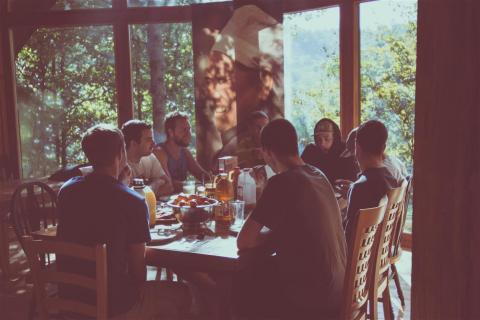Over the last couple of years of “Continuing the Conversation” and other meetings I have listened to the concerns of many when it comes to family and friends who have less than loving attitudes about people not like themselves. I will admit to not having a lot of experience with this (except for those who, through business interactions, made it clear they had no problem with “screwing me over” because of my race, but would attribute it to other “excuses”). Pizza and Social Justice has tried to find ways to help our members deal with these kinds of people. We have viewed a number of videos that tell the story of others who have had success in HELPING people make profound changes in the way they see others, and in how they relate to people who are different from themselves. In reviewing these videos there were some elements that were similar.
The most common thread among persons who possessed these negative feelings was that of never having come into close contact with people who were different. Most relied on what was “told” to them by other people (who likewise had no real dealings with people who were different), or the media (who wished to sell ratings or enforce the system that profits from keeping people separated). Such isolation allows myths to take root and to control how we interact with other people. This is the root of Bias.
The plot of these videos all shared the same theme, namely the minority person comes into contact with the socially isolated person, befriends him (despite his making it known from the start how much he is against people coming together), and through sharing each other’s “story” (this is how I like to refer to people getting to know each other), over time there is a change, and not only for the isolationist. The minority person also gains a lot from the relationship as it turns into a deep and meaningful friendship, until the negative feelings dissipate and the hate that the individual had is gone, and he realizes how much richer he is without it.
In witnessing this process there are a few things to be gained:
- The foundation for the relationship was not to “change” anyone. It was to find the similarities, and allow the similarities to strengthen their relationship.
- They learned to listen to each other and to respect each other’s views without having to reject the person.
- Each gave the other the opportunity to change. So often we do not allow people to change; instead, we are quick to condemn and to reject the person if they do try to change.
With our racist relatives and friends we have to come to the realization that we cannot change them. ALL CHANGE must come from within. All we can do is to help them change. In order to help what we can do is share ourselves, our attitudes, our thoughts, and our feelings unconditionally. But this has to come with a price. If we want them to hear us, then we will have to work to hear them. Willingness to listen does not mean you have to agree, you just have to respect their opinion as much as you want your opinion to be respected. With both stories being expressed in a mutual and respectful manner, you will both be in a better position to evaluate what is being said. In that atmosphere the exchange can be productive and you will both be able to build respect and love for each other.
Presently we are quick to judge when in reality we should be quick to help each other. We have all heard how small the world is becoming, and that smallness is making it more important for us all to come together rather than trying to stay separate. With this close proximity our neighbor’s pain is our pain as well. We are no longer separate.
